HOME > Japan SPOTLIGHT > Article
LOST & FOUND COWBOY – Uplifting Cross-Cultural Online Comedy in the Time of Pandemic(PART 2)
By Atsushi Ogata
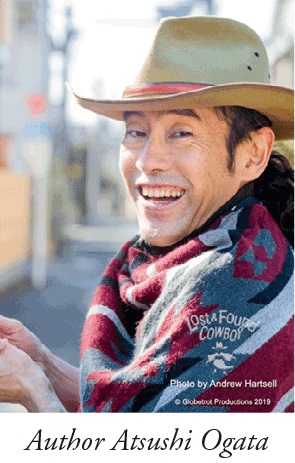
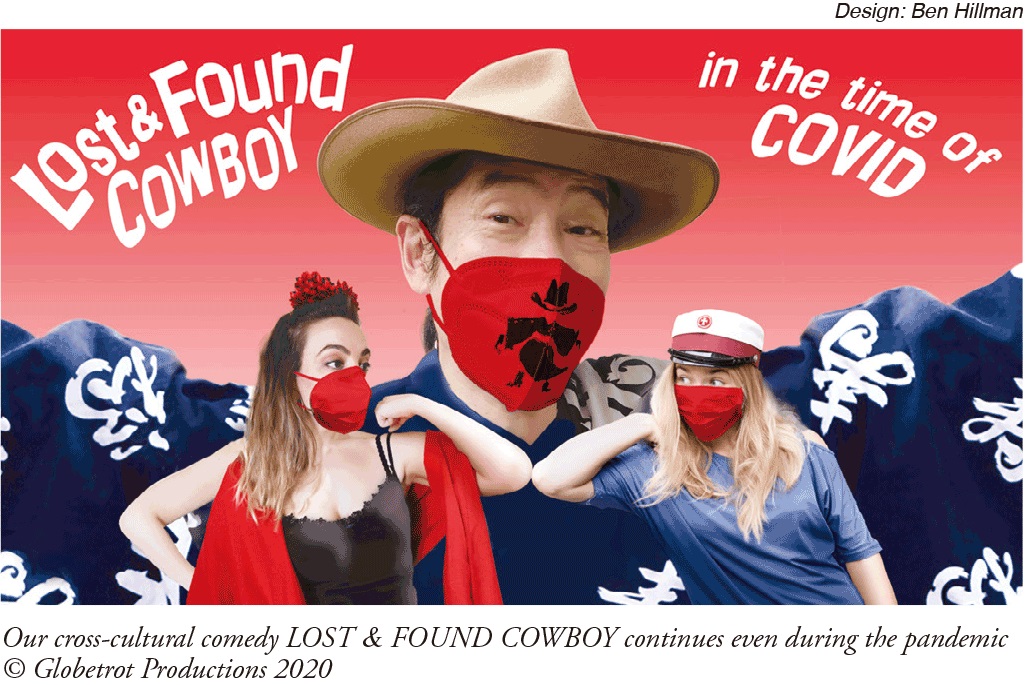
Before the Covid-19 pandemic, I had been performing stand-up comedy live in Tokyo and Los Angeles, and preparing the release of the first season of our cross-cultural comedy series LOST & FOUND COWBOY through the UK comedy platform Twisted Mirror TV.
As the pandemic spread across the globe, live comedy venues began to close, and film productions were shutting down. In March 2020 emergency "lockdown" measures were announced around the world.
"Virtual" Stand-up in the Time of Covid
As live performance opportunities stopped, we began performing comedy online on "virtual" open mics via Google Hangout and Zoom. I continued to play the same YUKATA COWBOY ® character, wearing my cowboy hat and Japanese yukata (casual summer garment), but I had to make a number of adjustments to perform in this new medium. While I was used to performing and acting out various characters using my whole body, with the virtual stand-up I had to adjust my performances to confine myself to the small area that could be seen by my laptop's webcam.
At the same time, I developed new sets specific to the Covid situation with guidance from my American producer Sian Evans. For example, I would tell a story about Yukata Cowboy being stopped by a police officer during the pandemic and getting arrested for violating the lockdown. In another set, I enacted confronting a bank robber wearing a Covid mask.
I found it difficult to gauge reactions online – with tiny screen visuals for audience reactions and the limitations of computer audio. During one of my first virtual performances, as I was re-telling a set that had gotten many laughs in live performances, I even asked the audience if they had set their "audio" to mute. That remark itself got some unexpected laughs!
On the other hand, it suddenly became routine to participate in virtual open mics in other parts of the world. In addition to performing with comedians in Tokyo, I now participated in open mics in the United States without ever leaving Japan.
Conceiving Collaboration Across Borders
As time went on, it became clear that we were in for a large, protracted lockdown – international borders were literally closing down. I wondered how I could continue to create our globetrotting comedy LOST & FOUND COWBOY, which centers on crossing borders, celebrating diversity and dancing. If my character, Yukata Cowboy, could not travel and live amongst other cultures, how could I continue that story?
On a beautiful sunny morning in May while walking through an empty neighborhood park in Tokyo, I thought of the perfect solution: this was the time to pursue a collaboration with two talented and humorous creators – Danish actress and film director Lærke Charlotte Olsvig in London and Spanish actress Xana del Mar in Madrid.
I first met Lærke and Xana at the 2016 Bilbao Seriesland Festival in Spain, where their comedy series "Piso" (Apartment) was awarded Best Sit-Com. Together they had written, acted and filmed a very comedic series about being roommates in an apartment in Madrid.
I loved their funny, on-the-mark performances and dramatic stories, and also their dance sessions, which included flamenco. We got along well at the festival. I found them ready to react and create at all times – Xana even imitated me hilariously one evening as we bar-hopped with the festival group. We joked about Yukata Cowboy appearing in one of their "Piso" episodes, and I remember thinking of a Yukata Cowboy episode where, in his usual mistaken, happenstance way, he ends up dancing in a music video with these two brilliant comedians. As we were all living in different countries, those were just funny ideas to laugh about at a bar.
Now, suddenly, we had the perfect opportunity to actually work together. If everyone around the world was under lockdown, couldn't I conceive a story taking place during the pandemic? The three of us could collaborate over Zoom from our countries spanning the globe.
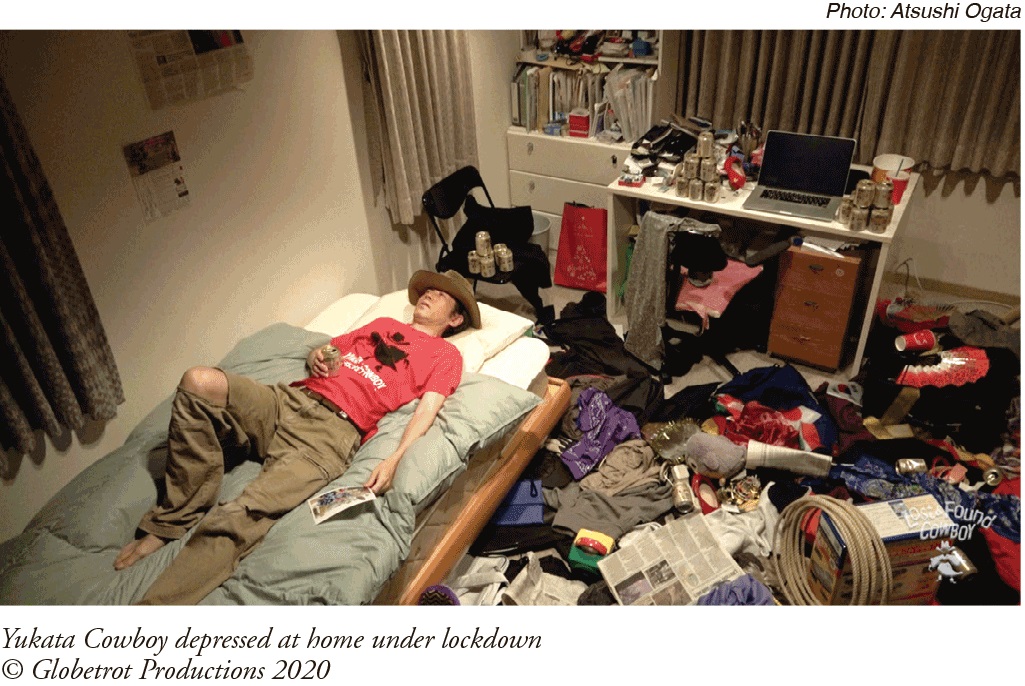
I had completed Season 1 of LOST & FOUND COWBOY, in which Yukata Cowboy's lover, Cindy, suddenly disappears from Tokyo. Before the pandemic, our initial plan was for Yukata Cowboy to literally travel the world to find Cindy and re-connect with her. Because of the pandemic I realized that Yukata Cowboy couldn't travel anywhere. He must be alone and isolated in his flat, sinking into a serious depression – the exact opposite of his natural bent. Discovering his state by chance over Zoom, two overseas friends, played by Lærke and Xana, reach out to him. Lotte, a Danish character to be played by Lærke, encourages Yukata Cowboy to start performing virtual stand-up comedy, just as I had actually begun performing virtually myself during the lockdown, and Xana's character in turn can try to cheer him up by offering to teach him flamenco.
A culturally iconic dance, flamenco would be a perfect expansion on the cross-cultural dance theme of LOST & FOUND COWBOY. I discussed the idea with my producer, Sian, and showed her Lærke and Xana's "Piso" series. She liked my idea. She saw sympatico strains of extemporaneous humor and physical comedy in Lærke and Xana's work. Even more, she understood their underlying kind and open attitude towards life as a match to the attitude of Yukata Cowboy.
Collaborating Online with Overseas Cast
I quickly wrote the storyline for the new season "LOST & FOUND COWBOY – In the Time of Covid" and proposed the idea of collaboration to Lærke and Xana. They were immediately interested. Because of the lockdown, they also had more time available and were willing to start right away.
We decided that our first step would be to film and edit a 1.5 minute clip – to test work flow, to determine technical specs, to see how we collaborated. I wrote a short script, filmed my part and shared it with Lærke and Xana. Then they filmed their parts, edited them together and sent the footage back to me, which I then edited.
Because Lærke and Xana had worked together extensively before on their series "Piso", they collaborated well remotely by phone and Zoom, even though they were in separate countries. Sian and I were impressed with how easily and how well the test came together.
Extended Online Table Read Led to More Ideas
I drafted our episode scripts and in early June we did a couple of online table reads with Lærke and Xana over Zoom. This was very inspiring as it generated more new ideas for comedy and cross-cultural intrigue. Both Lærke and Xana's natural talents as actresses and international performers significantly enriched the humor, cultural observations and the narrative of our story.
In flamenco, the dancers use abanico, Spanish fans. Xana and Lærke showed me the bright red wooden fans they used in "Piso", which would look fantastic for our flamenco dance scenes. That gave me the idea to also incorporate sensu, traditional Japanese paper fans with bamboo frames, in our new episodes.
As we discussed fans, Xana came up with a joke about how Yukata Cowboy and her Spanish character, Maribel, would each interpret the word "fan" differently. While Yukata Cowboy would say he needs a new fan, referring to the Japanese fan he held in his hand, Maribel would misunderstand, thinking Yukata Cowboy wanted more fans watching as he performed comedy online.
For a virtual stand-up performance, we decided that it would be more fun to have Lotte and Yukata Cowboy perform together. Lotte would play a police officer trying to arrest Yukata Cowboy, who has violated the lockdown. Lærke made the Lotte character very funny by acting childishly ecstatic to play a "police officer".
In "Piso" I had seen Xana successfully acting a character watching Spanish soap opera on TV and wanted to incorporate that into our script. Xana conceived and recorded the voices for a fictional soap opera that her character Maribel is watching on TV, as she snacks on Spanish olives.
We wanted to also include a Danish element as Lærke is Danish. We were filming in June – a time in Denmark when graduating students wear special caps for their commencement. We decided that Lotte's character, fixated on her graduation cap, could wear it in many scenes – expressing the same excitement she displayed at the prospect of playing a police officer. We brought this visual statement of cultural identity further into play with maps of Denmark on the wall and flags of Denmark on Lotte's stand-up microphone.
Because LOST & FOUND COWBOY is a cross-cultural series, Xana and Lærke purposely cast a racially and culturally diverse group of friends as the "audience" in the Zoom stand-up scene. We wanted to visually further emphasize the international nature of this story.
We also looked for ways to bring multiple languages into the story. Xana, as a multilingual European actress, has experience MCing in several languages. Because this production is a collaboration with Japan, she wanted to include spoken Japanese in the scene where she MCs "Ladies and Gentleman" in Japanese. Since Maribel welcomes the audience only in Spanish, English and Japanese, we decided that Lotte should comment on that in Danish and say that she missed hearing it spoken in Danish. These moments allowed us to recognize all three individual nationalities with humor.
We also played with national stereotypes. In my original script, I had written a scene where Maribel dares Yukata Cowboy to dance by holding up a red scarf like a matador. Before the reading, Xana was opposed to any reference to bullfighting, of which she doesn't approve. Through the process of development she found a way to perform this scene comedically in an amusing and absurd way.
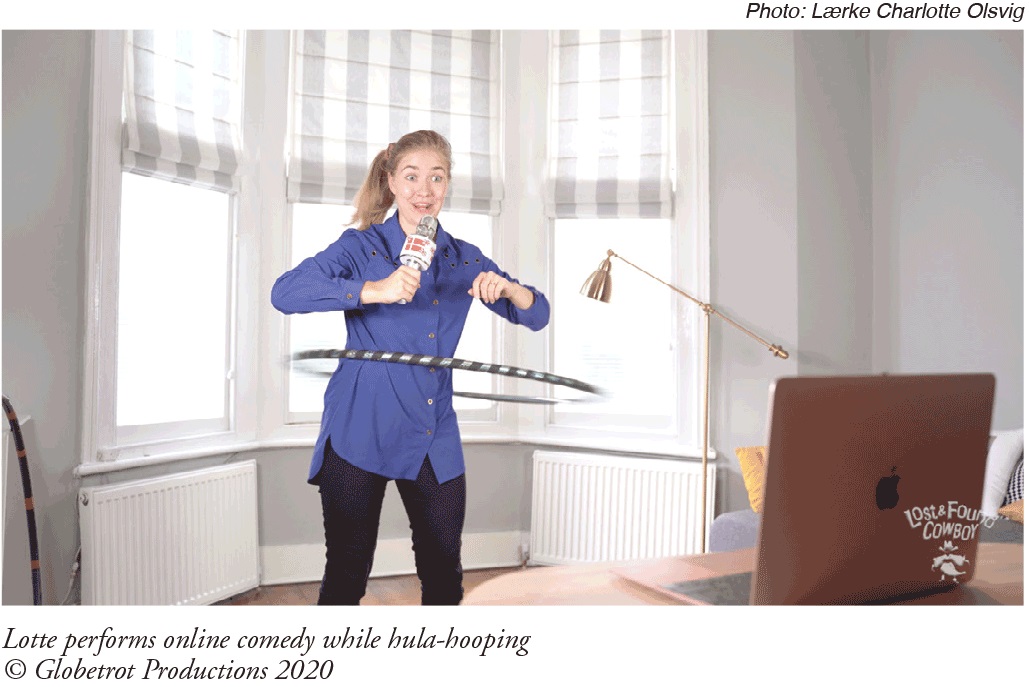
It was also important to us to continue the musical theme of national styles from Season 1. Through table reads and Zoom discussions, and with help from Xana's musician friend, we chose wonderful flamenco songs that would be authentic enough for Spanish viewers while also working for viewers outside of Spain.
Technical Tests & Pre-Production
To maintain the aesthetic and technical qualities we achieved in Season 1, we also brought on board our director of photography Motomu Ishigaki, our sound designer Masataka (Taka) Odaka and our animator Ben Hillman as consultants. We showed them our test clip and script and asked for advice on how to film and record this production.
Unlike normal film shoots where the camera and sound crew are physically present in the same space as the actors, because of the Covid lockdown each performer had to learn how to properly film and record their scenes individually and ahead of time. Over the next 10 days leading up to our actual film shoot, Laerke, Xana and I conducted technical test shoots in different locations inside our own homes. Then Motomu, Taka and Ben reviewed the footage and gave us suggestions to improve, and we tried again. We repeated the process a few times until we were all satisfied with the production value.
Motomu remotely advised us on camera angles, lighting and art direction. In addition to the Zoom shots where the characters would participate and record through computer webcams, he suggested that we film ourselves from the front and from 45 degree angles to maximize coverage and have more options and visual variations for editing. Motomu taught me to use and flag overhead light; how to use a desk lamp; how to properly use a halogen film lamp with a bounce. Sometimes I needed to re-shoot two or three times before getting it all right.
The quality of my HD camera was not sufficient for this shoot, so I purchased a new 4K camera. Although Japan did not have as strict a lockdown policy as countries in the West, many establishments were closed. For the first time in two months I ventured outside of my neighborhood, taking a public train.
Lærke and Xana also conducted similar technical tests. Xana's flat in Madrid was bright and sunny, but the weather was often more cloudy and rainy in London, and we found Lærke needed added light for most of her shots.
With Motomu, we also worked together on art direction. He gave suggestions on where, what and how to place items in the background.
Similarly, with Taka, our sound designer, we did test audio recording of various scenes. We discovered, for example, that I needed to walk softly even when Yukata Cowboy was upset, to keep my footsteps from interfering with the dialogue.
For Xana, we learned we'd need to secure a different microphone. Even then we still heard odd noises. Taka, in Tokyo, figured out these sounds in Madrid came from interference caused by the WiFi signal in Xana's room. We asked her to disable her WiFi when filming.
For the opening animation shots, Ben Hillman, our animator, gave direction on how each of us could film ourselves separately at different locations, on our own and without crew.
Filming
In June, we began filming with large time differences. We usually started our sessions at 5 p.m. Tokyo time – 9 a.m. in London, 10 a.m. in Madrid. Because Tokyo didn't really get dark until 7 p.m., we first rehearsed and filmed the London and Madrid scenes. After 7 p.m. we filmed everyone together. The time difference gave plenty of time to prepare each day, but it also meant I worked two shifts back-to-back in Japanese and then in European time. That schedule tended to deprive me of sleep.
Our first day was challenging as we were still figuring out how to work together. We soon came up with efficient ways to check Xana and Lærke's framing, before they filmed themselves. When filming Zoom shots with our computer webcams, we began recording ourselves simultaneously with our video cameras from another angle – each of us was doing a multi-camera shoot in our homes at the same time.
Every day of filming was engaging and inspiring. We laughed a lot and enjoyed the process. However, since we didn't have anyone managing data, after every shooting day Lærke and Xana spent significant time labeling and uploading all the footage filmed with their own cameras. To ensure a high quality sound mix, Taka also asked us to record room-tones for every angle we filmed. Sian and Taka checked our daily "rushes" to make sure everything was in order.
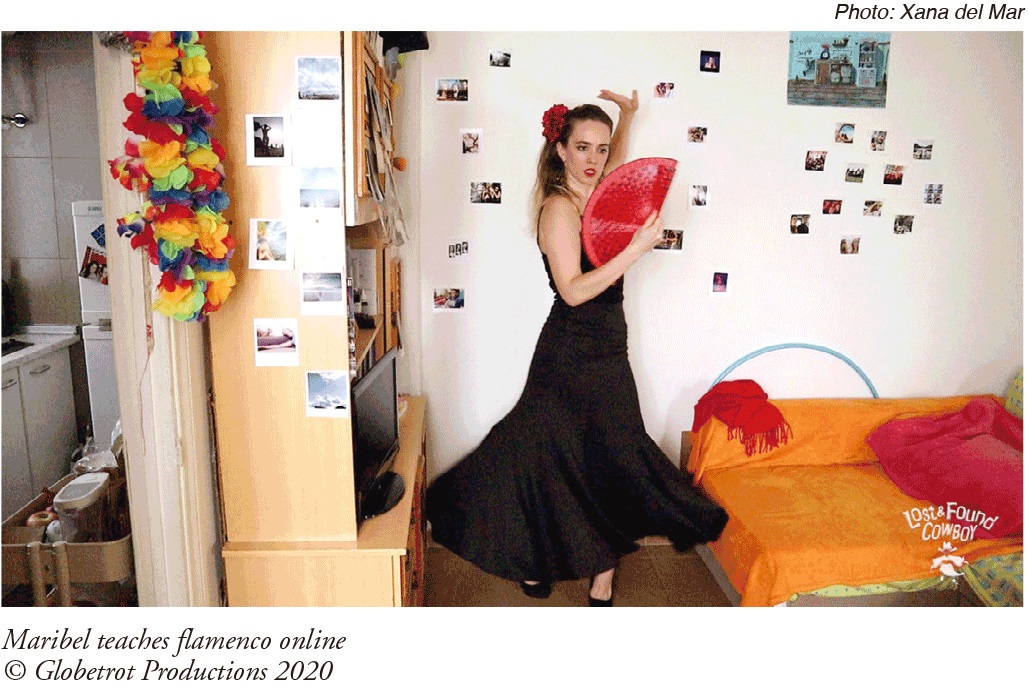
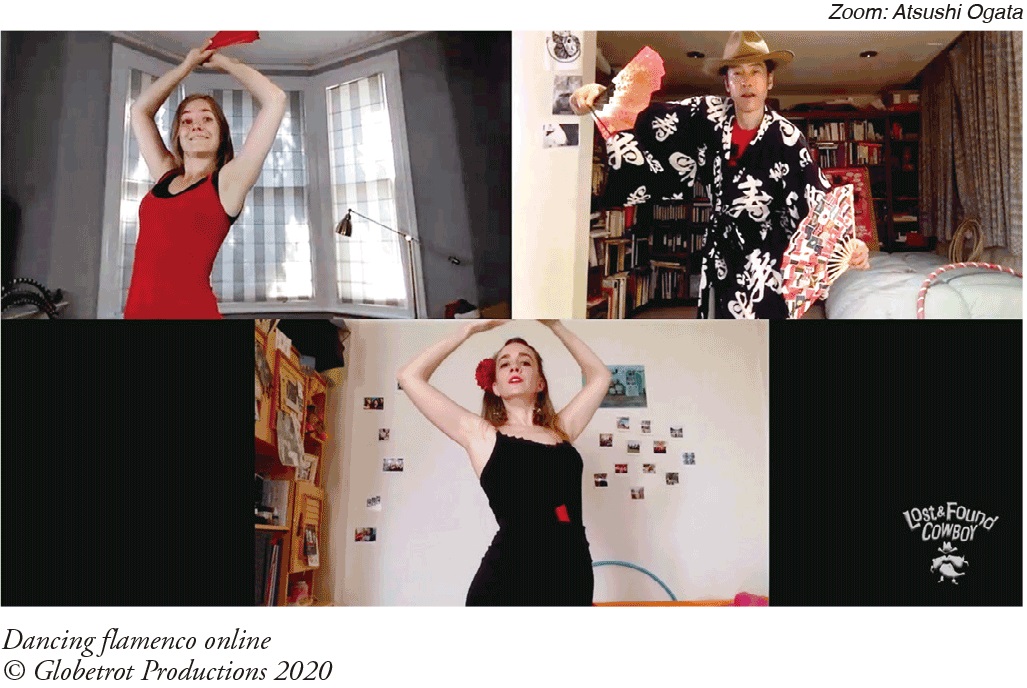
For filming our stand-up performance, first the three of us filmed the whole scenes ourselves. On another day we had a separate Zoom session where eight of Lærke and Xana's actor friends played the "audience". The actors dressed appropriately with funny hats and colorful clothes. Each came up with great reactions¬ – laughing, cheering, clapping, rolling off a chair or speaking in Russian.
For the flamenco dance sequence, Xana offered to have an extra rehearsal session with me to try out movements and design choreography. One of the most memorable ideas we came up with was the following: at one point, Xana would hold up the hem of her skirt and shake it right and left. I ended up imitating her by holding up the hem of my yukata and flipping it right and left! It was eye-opening and funny because in all my experience I had never thought of holding and flapping the bottom of my yukata in such a way, nor seen anyone else do it.
The day we shot the dance episodes was one of the hottest days in Europe – more than 31 degrees Celsius in London and higher in Madrid. Lærke and Xana were sweating as they danced from one sequence to the next. It wasn't as hot in Tokyo, where it was nighttime, but I was getting exhausted. I had to keep re-taking the shots as my hula-hoop kept falling to the floor before I could finish my lines. We literally needed to use our fans to fan ourselves to cool off during those scenes!
As Maribel coaches Yukata Cowboy in dancing flamenco, Maribel tells him to "stomp harder" as if he were angry. Since I was filming inside a Japanese house, I was dancing/stomping without shoes. I didn't notice until late the next day that during this jumping and stomping, I had actually broken a bone in my toe! It wasn't painful, but was taped for three weeks, and never healed completely. Still, we had an amazing shoot as we danced all day/night.
After the main filming, Lærke and Xana filmed themselves dancing so that Ben could incorporate their images into the opening animation. We filmed exterior establishment shots in our deserted Covid-hit neighborhoods, as Sian suggested. The contrasting light and architecture of each cityscape was intriguing and gave a better balance to our film.
Although it was challenging to wear many caps, to act and film ourselves while managing all the technical and logistic issues, this innovative way of filming and collaborating gave us the opportunity to work spontaneously, intensively and creatively together across international borders even during a lockdown. Each of us became so dedicated to the project that it kept our minds off the ensuing pandemic around us.
By the end, Xana and Lærke were joking that in future stories Yukata Cowboy might offer a combination of stand-up comedy and flamenco as therapy for depression!
Post-Production
Fortunately, in Japan, there were a number of public and private funding sources to support and encourage artists and performers to continue their creative work even during the pandemic. Through such initiatives, we were able to retroactively fund our production and continue with our post-production.
To my great relief, in September, when I resumed work, I found that our footage cut well together. I was also happy to see how well we performed together. The dance episode was so complicated that I had to break it up into 10 parts and edit each part separately before compiling.
Because the material was so successful, Sian and I decided to create not only our original web series version, but also linear versions for a variety of film venues.
As we began to complete our editing and sound mix, Miki Inagawa, our colorist, also came on board to color-correct our series with Motomu's supervision. As I write this article, our series is still on its way to completion, but we plan to release it in early 2021! Our trailer has just been selected for competition at the Asia Web Awards 2020. Hopefully, even in these challenging times, we can make you smile and laugh again with our unique cross-cultural brand of comedy.
For trailer and more info: https://www.lostandfoundcowboy.com
For "Piso" by Lærke Charlotte Olsvig & Xana del Mar: https://www.youtube.com/c/WeeFeeProductions
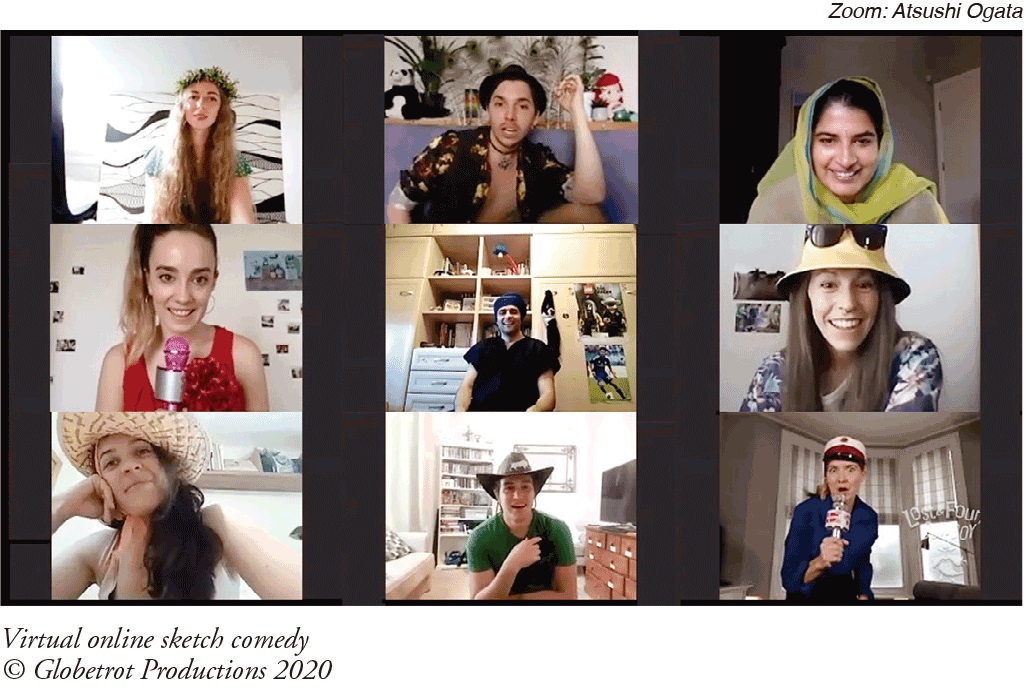
(2021/01/15)
Atsushi Ogata
Atsushi Ogata is a film director, screenwriter, video artist, actor and comedian, and a graduate of Harvard and the Massachusetts Institute of Technology. Ogata's films and videos, including his theatrically-released Japanese comedy feature "CAST ME IF YOU CAN" (WAKIYAKU MONOGATARI), have been screened and awarded worldwide. In recent years Ogata has expanded into web series with TRICK OR TREAT: I LOVE AMERICA!, YUKATA COWBOY, MONA LISA COWBOY and LOST & FOUND COWBOY.www.atsushiogata.com

Japan SPOTLIGHT

- Coffee Cultures of Japan & India
- 2025/01/27
























